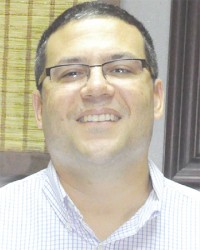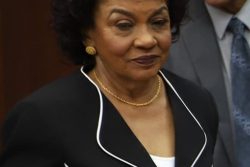Despite winning only two out of five games in the opening stages of the Trinidad and Tobago Outdoor Women’s League, Head-Coach of the GCC unit Phillip Fernandes said he is confident they can improve when the tourney continues on May 16th.
The Bourda-based Georgetown Cricket Club (GCC) in their inaugural campaign in the Twin Island Republic, secured wins against Ventures and Notre Dame Hockey Clubs respectively while going down to Magnolias, Paragon and Checkers Hockey Clubs correspondingly.
In an exclusive interview with Stabroek Sports prior to the team’s departure, Fernandes said “I am absolutely confident that our ladies hockey team will do better on this second visit to Trinidad. On their first visit, the ladies took some time to re-familiarize themselves with the playing surface and also to overcome their nerves and anxiety of the competition”.

He further said “By the end of the last trip I already saw evidence in their performance of greater composure and confidence. As the competition progresses they are better able to make critical decisions under pressure and perform the technical skills more effectively”.
“Tactically I expect our team to also be better than we were two weeks ago as we now have had the chance to analyze video and plan our adjustments given the opponent’s strengths and weaknesses. I am excited to see them compete this weekend”, he added.
Asked about the areas the team needed to improve on going into the second part of the season, he declared “We in Guyana have suffered from a lack of match practice. We have too few teams at the moment but the development of women’s hockey in some of the clubs will result in an improvement of that in the near future”.
Fernandes who also holds the post as Guyana Hockey Board President continued “Also the poor drainage conditions of the city affect the availability of grounds any time there is rain which interferes with the hockey outdoor season. This lack of match practice showed up when the team played their first few matches in Trinidad”.
He noted “The maturity and confidence exhibited by most of the Trinidadian players was absent from some of our Guyanese despite us being able to match them with skills. This is a difficult factor to correct in a short time but their good performances on the last outing has certainly boosted their confidence and should help to bring them up to speed quickly”.
Questioned how far Guyana is behind Trinidad and Tobago with regards to the overall quality on display, he noted “Guyana is not far off from Trinidad at this point. At the club level our ladies have shown that they can compete and are capable of beating any club in Trinidad on their day”.
According to Fernandes “The two things that Guyana would need in order to be more competitive at the international level are (1) a broader player base from which to make their selection and (2) an artificial pitch on which to train. Guyana has the talent to compete with anywhere in the region and have been doing so even though we have fewer hockey players than many of them”.
He further said “All other hockey-playing nations in the region however have their own artificial pitches on which to train and prepare for international competition. This is vital as the game is significantly different on grass as opposed to an artificial pitch. These two areas have been placed foremost on the list of priorities of the Guyana Hockey Board”.




